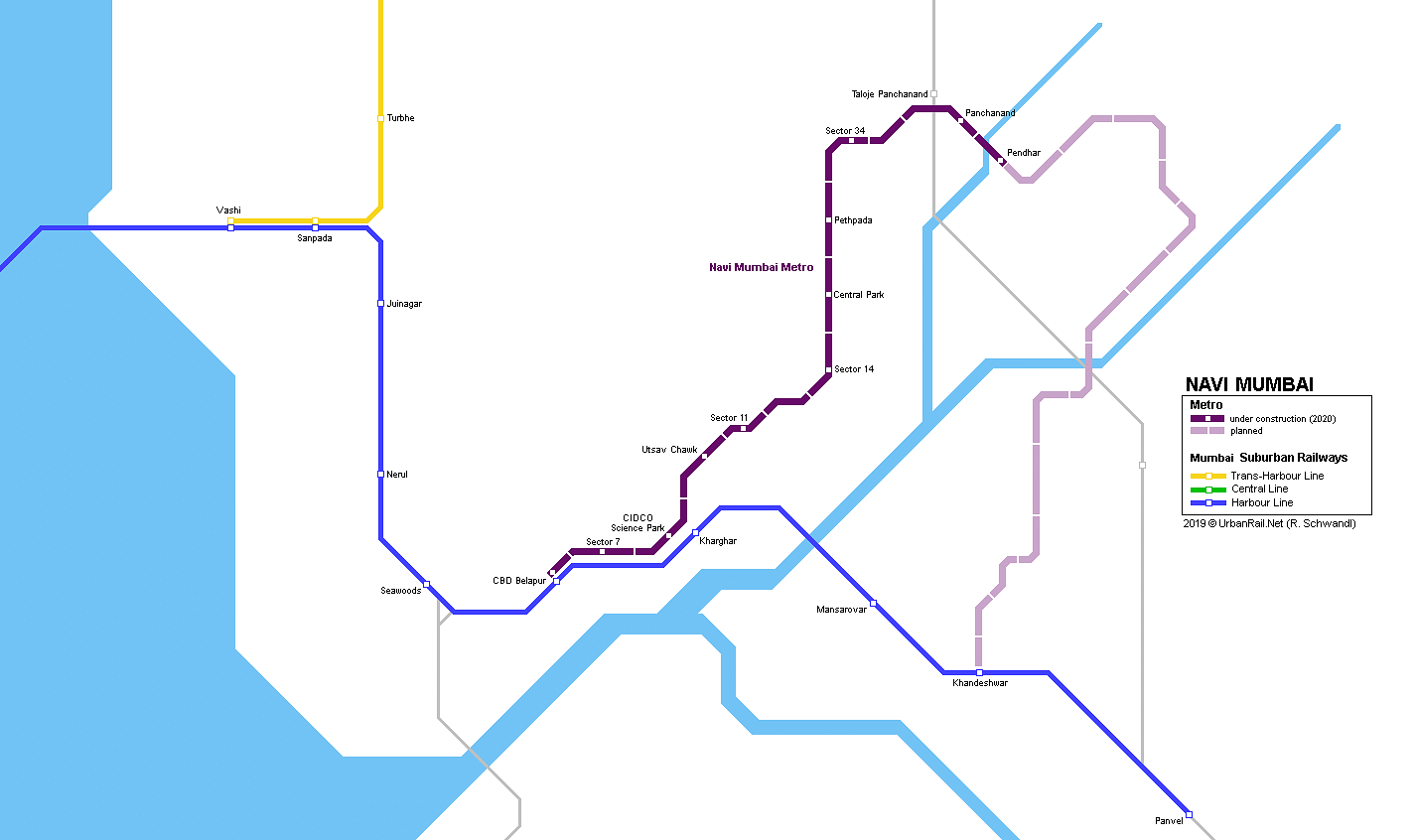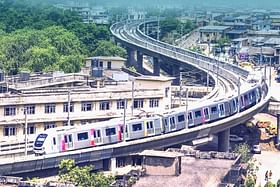Once operational, the transit network will be a great relief to the residents of the connecting areas and is expected to alleviate traffic congestion in busy areas of the city.
The Navi Mumbai Metro (NMM) Line-1 is nearing completion and is expected to become operational soon.
The first phase of NMM Line-1 will cover an 11.1-km-long stretch between Belapur and Pendhar.
It will have 11 stations — Belapur, Sector-7 Belapur, Science Park, Utsav Chowk, Sector 11 Kharghar, Sector 14 Kharghar, Central Park, Pethapada, Sector 34 Kharghar, Panchnand and Pendhar Terminal.
Commissioner of Metro Rail Safety (CMRS) conducted an inspection of Metro Stations-1, 2 and 3 between Belapur and Belpada on 17 April.
City and Industrial Development Corporation (CIDCO), the nodal agency for the project will soon receive the CMRS certificate for the Belapur-Kharghar stretch and following which it can begin operations on the line.
CMRS certification was already obtained for the Kharghar-Pendhar stretch in October 2021.
According to officials, CIDCO had called tenders inviting government agencies to do the construction of Metro, including operations and maintenance. The Delhi Metro Rail Corporation (DMRC) expressed willingness to do only the engineering work and therefore, MahaMetro was roped in, reports Indian Express.
MahaMetro is now responsible for operating Navi Mumbai Metro Line 1 as appointed by CIDCO.
MahaMetro has been granted the power to recruit engineering professionals and manage the operations and maintenance by themselves.
A 10-year contract worth about Rs 500 crore has been signed as a result. According to an official, CIDCO will pay an annual maintenance fee of Rs 50 crore, and in return, MahaMetro will handle the operations and revenue collection for Navi Mumbai Metro Line 1.
There is a maintenance depot at Taloja, while two traction sub-stations are located at Panchanand and Kharghar. The line is expected to operate at 15-minute intervals during peak hours, according to the plans of CIDCO.

Delays In The Navi Mumbai Metro
Under the Navi Mumbai Metro Project, CIDCO had finalised four new metro lines. The project’s foundation stone was laid by the ex-chief minister of Mumbai, Prithviraj Chavan, in 2011, and work began soon thereafter.
However, the project encountered continuous delays due to several factors, including changes in plans, issues with contractors, protests, and difficulties with the land acquisition by CIDCO.
These delays resulted in increased costs for the project execution. The Metro Line-1 project’s estimated cost is Rs 3,400 crore, out of which CIDCO has already infused Rs 2,600 crore.
To expedite the project, CIDCO received a supporting line of credit of Rs 500 crore from ICICI Bank.
Following a 12-year-long delay, last year on 30 December 2022, the trial run of the metro line was successfully conducted for the corridor spanning 5 km and running across five stations — connecting Pendhar and Central Park, as per earlier reports.
The line is further proposed to link Belapur to Navi Mumbai International Airport (NMAI).
Benefits Of This Network
Once operational, the transit network will be a great relief to the residents of the connecting areas and is expected to alleviate traffic congestion in busy areas of the city.
For residents of Taloja, Ghot, Koyanaville villages, and other surrounding areas, the metro network will provide a rail connection that was earlier lacking and will enable faster commutes compared to road transport.
The lack of connectivity options other than buses in these regions had forced many people to rely on private vehicles.
Additionally, the major housing projects in Kharghar are expected to benefit from the Navi Mumbai Metro project — as the upcoming routes will increase housing demand in the locality and elevate the real estate market in the area.
Over the years, many people had purchased flats in Navi Mumbai relying on the proposed metro connectivity, however, they were unable to move due to the project’s inactivity.
The starting of operations will not only cater to the current residents but also provide opportunities for new residents who have been waiting for this improved connectivity, to move into the area.
Furthermore, the project will bring benefits to Belapur, which is home to many important commercial establishments and serves as the business district of Navi Mumbai.
Neo-Metro For Navi Mumbai
After the operationalisation of lines 1, Metro 2, 3 and 4 work will commence. Neo-Metro is being planned, which is cost-efficient due to the expected ridership of only 8,000 during peak hours in Navi Mumbai compared to Mumbai Metro’s over a lakh ridership, according to the official.
The Neo-Metro trolley bus has rubber tires, overhead electric traction and a cost-effective design, with lower system requirements than traditional rail systems. CIDCO plans to finish the project within two years.
The Neo-Metro is priced at Rs 2,000 crore, a fraction of the Rs 9,600 crore cost of a conventional metro. The project has a Rs 1,000-crore credit line, and tender calls and contractor appointments will follow shortly, according to an official.


